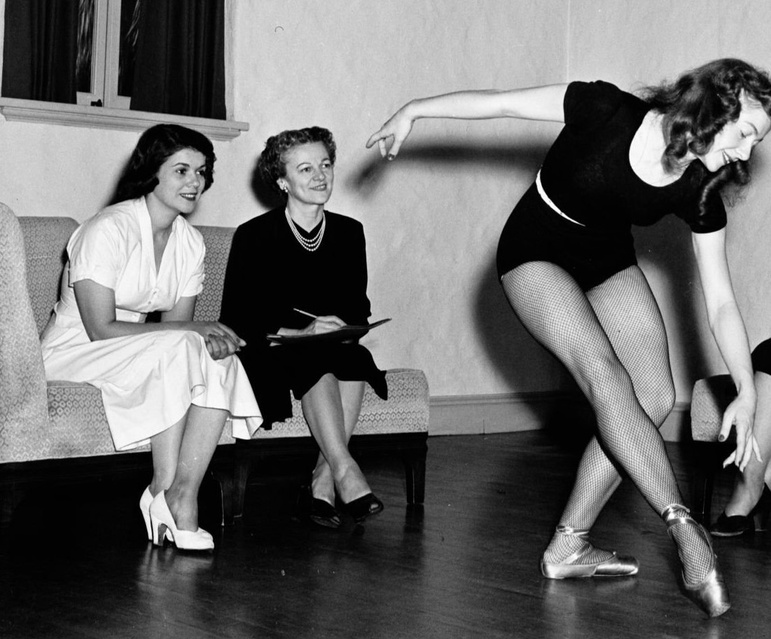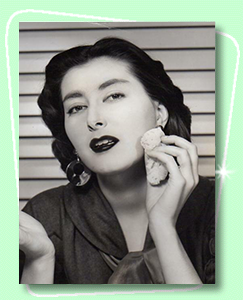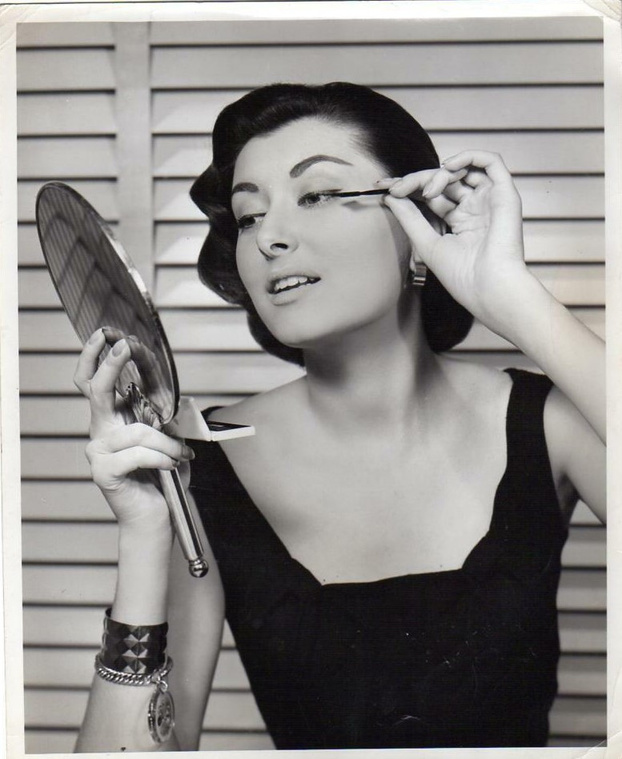Park
She’s known to historians as the companion of Jack Warner, or to gossips as the model impregnated by Ronad Reagan in the 1950s. She was one of the subjects of several books including West of Eden: An American Palace by Jean Stein, Cary Grant: A Brilliant Disguise by Scott Eyman, and Nancy Reagan: The Unauthorized Biography by Kitty Kelley. The most hardcore filmgoers would recognize her for her walk-on role in The Ten Commandments (1956). It’s difficult to fathom that somebody this interesting would be an unknown, but it’s true. There’s a lot that people don’t know about this interesting woman, such as the fact that she was a respectable actress who almost got one of the most sought-after roles in the history of films.
Although she went by various names like Jacquelyn, Jacqueline, Jacquelyne, Jackie, and Jacky, her name was Mary Scarborough.
She was born in June 1926 in Philadelphia, Pennsylvania. Her father abandoned her as a toddler, while her mother was unstable and often left her in the care of others. At the age of 8, she was enrolled into the Catholic Home of Destitute Children on 2901 W. Allegheny Avenue where she reportedly endured abuse. She did credit the institution for giving her a great education. She rarely spoke about her childhood because of the trauma and sadness that she endured, but she didn’t sulk in it.
Instead, she decided to do something to better her situation.
She went to New York City as a teenager to find stardom, or at least some way of supporting herself. On July 28, 1949, she took a taxi to the studio regarding a -in her words- breakthrough film role when the driver got into an accident. She got a large settlement, so she rented an apartment and got an agent who signed her to Warner Bros after insisting that she change her name to Jacquelyn Park. She then met with director Edmund Goulding who mentored her on the industry. It seemed glamorous, but the buildup was slow. She got walk-on roles in Red, Hot, and Blue (1949), Copper Canyon (1950), and The Secret Fury (1950), which were forgettable if not forgotten films. She modeled for March of Dimes, Carrell Speedway, and the Fireworks Show. Her pictorials were in magazines like Sir!
and Frolic. She was crowned Miss Queen of the Car Wash in 1951. On July 31, 1951, she was given a primetime appearance on I Want to Get Married where she described the type of husband she was searching for. Jack Warner liked her a lot and saw that she had potential as an actress.
If acting didn’t give her fame, her love life did. She made headlines for dating celebrities like Mickey Rooney, Howard Hughes, Henry Fonda, Dick Powell, Victor Mature, and Cary Grant. The latter was one of the most high-profile romances, and she’d later say in an interview that “The first time I ever had a date with him, he was dressed up like a woman.” Her boyfriends were usually unfaithful and used her. She wasn’t complaining though, as this city was good to her compared to her days as an orphan in Philadelphia. Her agent even got her a room at the Hollywood Studio Club on 1215 Lodi Place, which would later be home to stars like Marilyn Monroe and Barbara Rush. Her parts became progressively larger, but she was mostly limited to television.
Jacquelyn Park would probably refer to 1955 as a year of excitement and disappointment. She was crowned Miss Ceylon, which won her the starring role in Women’s Reformatory (1955) by Allied Artists alongside Ann Carroll. It was a salacious script that would be tossed due to budgetary concerns. In August 1955, Jack Warner gave her the opportunity of a lifetime. Mike Todd was casting for the role of Princess Aouda in Around the World in 80 Days (1955). Warner introduced her to Todd, and she tested for the role. Others who tested were Suzanne Alexander, Marla English, and Sylvia Lewis. Ultimately, she wasn’t chosen and eventually Shirley McClaine was selected.
Jacquelyn Park’s test footage is available at the Library of Congress if anyone is interested in viewing it.

It seemed that another opportunity was within her grasp when she won the role of The Existentialist in The Bachelor Party (1957) among a field of thirty actresses. It was a difficult part to do. In fact, it was so difficult that she was replaced by Carolyn Jones part-way during the filming. She did rebound by landing a starring role in Gun Girls (1957) alongside Eve Brent, which ended up being her most prevalent onscreen role. As the years progressed, she discovered things about Hollywood that were cringeworthy -and that I certainly wouldn’t publish-about men she once admired like Frank Sinatra and Joe DiMaggio.
She -tired of acting- delved into writing, hoping to publish her first novel My Hollywood Diary that had characters whose backgrounds were uncomfortably close to that of the moguls in Hollywood. Unfortunately, nobody dared to publish it for fear of backlash by the elite in Hollywood. She used her savings to start an antique store instead, but it folded shortly afterwards.
Although disappointed, she was crowned Miss Salton Sea months later which pulled her back into the limelight. She was featured in the magazine Pictorial Living on four occasions and was cast in Elvis Presley’s King Creole (1958).
Her marriage to Dr. Mortimer Hartman -whom she met while getting treatment for a drug addiction- of the Psychiatric Institute of Beverly Hills ended in less than a month as she developed feelings for her former boss Jack Warner. Their relationship became romantic in the 1960s as he grew distant from his wife, and Jacquelyn became his companion for roughly a decade. He rented an apartment for her and gave her a salary of $350 a week. According to Jacquelyn, Warner “was a champion liar” who would praise her acting ability to boost her confidence. She described him as cheap as she observed things that he’d do to save money, such as parking far from a venue so he wouldn’t have to pay a valet. Although their relationship was toxic, it had its benefits. Jacquelyn learned the secrets of Hollywood and its people. She recalled Warner telling her that Elizabeth Taylor wasn’t a good actress, but it didn’t matter because she was bankable.
In 1966, she tried to publish another story titled Don’t Run My Love, but was unsuccessful. It was weeks later that Jack Warner ended their relationship at the urging of his wife. He gave Jacquelyn $5,000 and -on occasion- assisted her financially. The irony is that even though she detested Warner, she adored his wife. She’d later describe her in an interview with Jean Stein as a good wife who took care of him. Jacquelyn Park fell into a deep depression, and used alcohol to ease her sorrows. She later went to Alcoholics Anonymous, where she recovered and was ready to move forward.
Her comeback was imminent when she penned a tell-all memoir titled Goodbye, Jack Warner, which was scheduled to be published by Grosset & Dunlap in January 1980. They quickly reversed course as outside influencers deemed the memoir too controversial. She gave up on the idea of Hollywood and became a travel agent in Manhattan. It wasn’t until 1989 when journalist Kitty Kelley telephoned her asking for some information about her relationship with Ronald Reagan. In what became a bestseller, Nancy Reagan: The Unauthorized Biography told salacious details of Ronald Reagan’s years as an actor. Jacquelyn said that Reagan impregnated her and denied that the child was his. She gradually began granting other interviews until the 2000s when she disappeared entirely.
I spent months trying to research whatever became of her.
Although there is no concrete evidence to prove this, I spoke with various sources who say that there was a woman of the same name and age-range who was an escort in Manhattan in the 2000s. One of the sources even confirmed that she would speak about her affair with Reagan and often portrayed different characters during their liaison. Unfortunately, the source said that she passed away in a nursing facility in the 2010s. I can say for a fact that her last known address was on 89th Street in New York City, and her telephone number is disconnected. If she is alive, I hope that she is happy and active. Hopefully, her unpublished memoirs will someday resurface.
“There is no such thing as complete happiness, but there is such a thing as happy moments.” - Jacquelyn Park


50s






